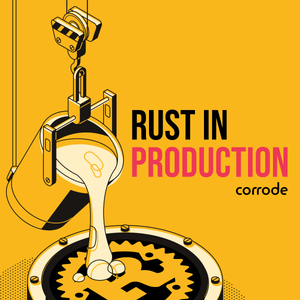Results from the Survey
A few weeks ago, we asked you to fill out a survey about the Rust in Production podcast. Thank you to everyone who participated! We received a lot of valuable feedback. In total, we got 82 responses. Here are some of the key takeaways: How did you discover the "Rust in Production" podcast?
- 43% found the podcast on Mastodon
- 21% Podcast directory (Apple, Spotify, etc.)
- 9% Recommended by a friend
- 6% Twitter
- 5% LinkedIn
- 5% Search engine
- 4% Reddit
- 7% Other
How Many Episodes Have You Listened To?
- 26% have listened to all episodes
- 27% have listened to most episodes (more than half)
- 27% have listened to some episodes (less than half)
- 10% have only listened to one episode
- 10% Other
Which Aspects Of The Show Do You Enjoy The Most?
- 96% enjoy the technical content (Tech Deep Dives)
- 49% enjoy the business motivations to choose Rust
- 8% other
Top 5 topics listeners want to see covered in future episodes:
- Cloud native development and microservices
- Enterprise adoption
- Performance-critical applications
- Web and network services
- Ecosystem deep dives
Top 5 suggested changes for the podcast:
- More technical focus
- Improved audio quality
- Diversity in guests
- Tighter editing
- Format variations
Current level of experience with Rust among listeners:
- 15% Beginner (less than 1 year of experience)
- 46% Intermediate (1-3 years of experience)
- 19% Advanced (3-5 years of experience)
- 14% Expert (5+ years of experience)
- 6% Don't use Rust, but interested in learning
How listeners typically listen to "Rust in Production":
- 60% While doing household chores
- 58% While commuting
- 26% While exercising
- 21% Dedicated listening time
- 10% During work breaks
- 9% While coding
- 10% Other
How 'Rust in Production' influenced perception of Rust's viability in production:
- 41% Somewhat improved confidence in Rust for production use
- 36% No change in perception
- 19% Significantly improved confidence in Rust for production use
- 4% Don't have an opinion
Aspects of Rust in Production listeners are most interested in:
- 75% Systems programming
- 59% Web development
- 48% Data processing and analysis
- 46% Embedded systems
- 43% Network programming
- 25% Game development
- 21% Machine learning / AI
Formats listeners are most interested in:
- 35% System architecture deep dives
- 28% Advanced Programming Concepts in Rust
- 27% Idiomatic Rust discussions
- 9% Pair programming sessions
- 1% Other
Office Hours:
Join our Corrode Office Hours every Thursday at 4 PM UTC. Bring your questions, and we'll try to help you out! Dates: August 15, 22, 29; September 5, 12, 19, 26; October 3. To learn more, check out the office hours page on our website: https://corrode.dev/office-hours
Links from the Episode:
The History of Rust - Steve Klabnik:
https://youtu.be/79PSagCD_AY?si=oNH9u1HPQ9welYjZ Nickel Framework by Christoph Burgdorf:
https://nickel-org.github.io tokio on crates.io:
https://crates.io/crates/tokio The 'New Rustacean' podcast:
https://newrustacean.com/ Simon Brüggen (M3t0r) on GitHub:
https://github.com/M3t0r Simon Brüggen (M3t0r) on Mastodon:
https://hachyderm.io/@m3t0r Matthias Endler on Mastodon:
https://mastodon.social/@mre About corrode Rust Consulting:
https://corrode.dev/about 'Rust in Production' Podcast on Apple:
https://podcasts.apple.com/us/podcast/rust-in-production/id1720771330 'Rust in Production' Podcast on Spotify:
https://open.spotify.com/show/0Hf6gWrzpSzXp1X0cebbsTCredits:
Audio editing and mastering by Simon Brüggen (M3t0r).
About corrode:
"Rust in Production" is a podcast by corrode, a company that helps teams adopt Rust. We offer training, consulting, and development services to help you succeed with Rust. If you want to learn more about how we can help you, please get in touch.
